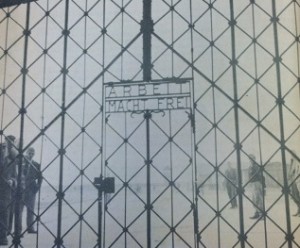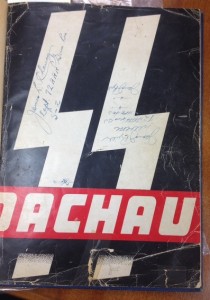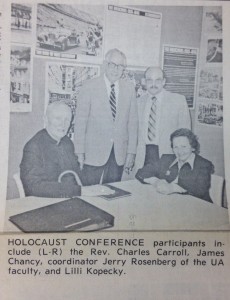By: Allyson Holliday, W.S. Hoole Library Complex Copy-Cataloguer
This post is one of a two-part series in recognition of Holocaust remembrance week April 27–May 4, 2014. The theme designated by the United States Holocaust Memorial Museum for the 2014 observance is Confronting the Holocaust: American Responses. Part I of this series features testimony from Joe Sacco and James Chancy. Part II, to be posted on May 9, 2014, will feature the story of William Denson, an Alabama lawyer who prosecuted Nazi war criminals in proceedings at Dachau.
Dachau was the first concentration camp built by Nazi Germany in World War II. Dachau held 8,000 to 10,000 prisoners. Most camp records were destroyed weeks before Allied soldiers arrived. Records that were pieced together showed that more than 228,000 prisoners were processed there between 1933 and 1945. At its peak in 1944, Dachau held as many as 60,000-80,000 prisoners. It was a disposal site for persons killed elsewhere as well as a site for the murders of tens of thousands of Czechs, Russians, Poles, Jews, Gypsies, and other Germans. At the time of liberation, there were about 32,000 prisoners left in Dachau. The surviving prisoners suffered from starvation, exhaustion, and various diseases due to malnutrition, poor sanitation, and lack of medical care. The following experiences spotlight Hoole library items and the thoughts of two Alabama soldiers who participated in the liberation of Dachau.
Joe Sacco
Where the Birds Never Sing, is a tale of the horrifying but triumphant story of American soldiers in World War II. The story is told through the eyes of Joe Sacco, a farm boy from Birmingham, Alabama who survived the landing at Normandy and the terrors of the Battle of the Bulge. As part of the 92nd Signal Battalion and General Patton’s Third Army, Joe Sacco and his fellow soldiers found themselves on the frontlines of the Allied movement through Europe. Even after more than a year of battles, nothing could have prepared him for the horrors the battalion discovered behind the walls of Nazi Germany’s Dachau. The 92nd Signal Battalion were among the first American troops into the camp and it was there that they faced the ultimate importance of the Allied mission – stopping Hitler’s Holocaust. They liberated the surviving prisoners at Dachau and gained an even deeper appreciation for the value of human life and were appalled at the barbarous inhumanity of Hitler’s Germany. Joe Sacco’s transformation from an Alabama farm boy to a courageous soldier and liberator are a testament to the strength and resiliency of ordinary soldiers.
Joe Sacco wrote on April 29, 1945:
“The gun battle didn’t last long. In about 15 or 20 minutes, it was all over…all the men got real quiet as we crossed the threshold into the camp. The smell that had caught our attention as we approached the wall was now overwhelming. Within a few steps, we all came to a stop and looked around in disbelief. I had seen carnage at Normandy. I had seen my buddies die right in front of me and whole towns get blown to hell. But I had never seen anything like this. Nothing could have prepared any of us for the horror laid before our eyes. No one said a word. It was as if everything slipped into slow motion, where every second took an hour to pass, where every minute was filled with such incredible sorrow that it seemed it would never end. I was nauseated, dizzy, confused. My brain couldn’t comprehend what my eyes were seeing.” (Where the Birds Never Sing, 2-3)
James Chancy
Former Tuscaloosa Public Safety Commissioner, James Chancy, was a captain in the 72nd Anti-Aircraft Battalion. His unit also helped to liberate the gruesome Dachau death camp. Hoole Library holds his copy of the official U.S. Army report of Dachau completed on site after the war. An undated newspaper clipping from the Tuscaloosa News laid in the report quotes James Chancy:
“The human mind has the ability to cast aside things you don’t particularly want to remember. That, I guess, is the thing that has saved the people involved who were prisoners in the death camps and the soldiers who encountered the horrors while liberating them” (Tuscaloosa News).
The foreword of the Army report states that Dachau “will stand for all time as one of history’s most gruesome symbols of inhumanity. There our troops found sights, sounds and stenches horrible beyond belief, cruelties so enormous as to be incomprehensible to the human mind. Dachau and death were synonymous” (Army Report, 2). The full Army report is available online through the University of Wisconsin, although viewers should be aware that there are graphic images contained within the report.




One Response to Confronting the Holocaust: Alabama Responses to Dachau, Part I